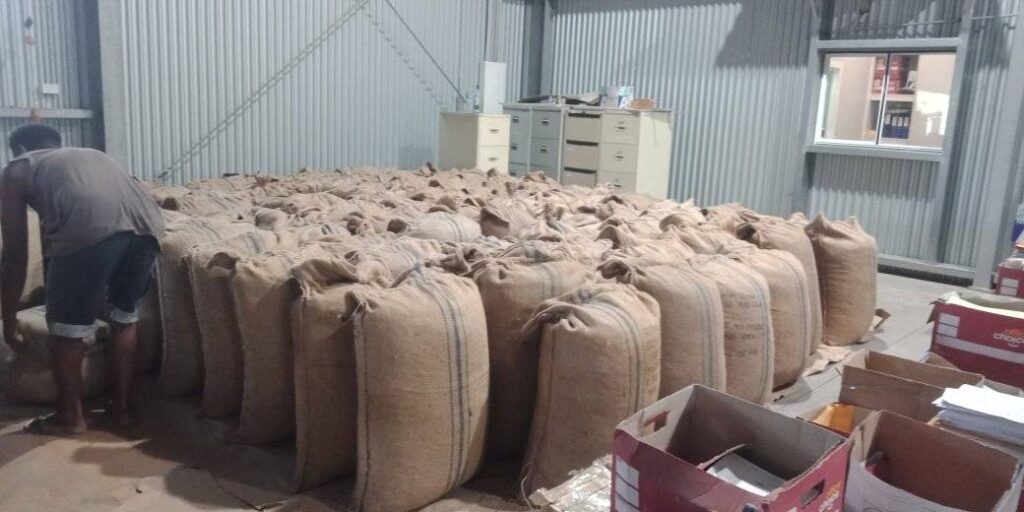Premium sun dried Solomon Islands cocoa exported to the United Kingdom
Solomon Islands today sent its first Less-than-container Load (LCL) shipment of premium cocoa to chocolatiers in the United Kingdom as part of an innovative new pilot project.
This container, which had cocoa beans from 50 farmer groups and consolidators across Guadalcanal and Isabel, was shipped under the Less Than a Container Load (LCL) Access to Markets project, piloted by local agribusiness entrepreneur James Kana of Ueniusu’unu Agribusiness Group.
The initiative, funded by the Governments of Australia and New Zealand through the Pacific Horticultural and Agricultural Market Access Plus Program (PHAMA Plus) under its Export Business Recovery Initiative (EBRI) Grant, allows local cocoa growers and consolidators to share the costs of freight and logistics which had increased as a result of COVID-19. It will achieve this through the use of a digital platform where exporters can share information as well as the space and costs of shipping containers for export.
Currently, there is no option to access a Less-than-Container-Load (LCL) freight consolidation system in the Solomon Islands or other freight-sharing facility in the Solomon Islands. For the country’s logistics sector, freight forwarders and agents, COVID 19 has exacerbated the usually low and unpredictable demand for break-bulk (alternative to LCL) freight options or palletizing of consignments, which are labor intensive and time-consuming. This represents a significant constraint to smaller and medium-sized exporters, making certain export and business opportunities unviable.
“We’ve shipped over 150 bags of premium sun-dried cocoa beans to the UK. From here the beans will be travelling on to Malaysia, then it takes another boat to the UK. These beans will be going out to two buyers in the UK, Firetree and Pump Street,” Mr Kana said.
Smaller holder farmers use a digital platform to pool their produce to fill a container together for export, allowing people around the world to enjoy delicious chocolate made from premium Solomon Islands cocoa beans.
“Through sharing the cost of using an integrated LCL system and storage facility, smallholder growers and consolidators will be able to have access to otherwise inaccessible export markets. The collaborative nature of the integrated LCL system makes it possible for each stakeholder to buy-in and be able to see the value of what they are investing in. It makes the freight cost of exports proportionate to the volumes being traded and available from smallholder growers and consolidators.”
PHAMA Plus piloted the EBRI in the Solomon Islands as a response to the significant strains brought about by COVID-19 on Pacific Island supply chains and for low-income producers and workers within them. COVID-19 has also had a negative impact on the utilisation of shipping containers at the main port. Currently, for every five containers which arrive with imports, only one container is exported. This means that four containers are ‘empties’ and sitting idle in the port area or they are loaded back on the ship with no value being gained from the unutilised container space. This ratio will get worse as major exports have been hit-hardest. Overall, it represents a missed opportunity, is a waste of money and comes at a high environmental cost.
The International Centre for Development Partnerships funded the development of the digital platform. Other partners in the project include Solomon Ports, Express Freight Management (EFM), Earth Water People and Common Code.

About LCL
The LCL initiative offers a long-term viable option for small medium exporters of high value commodities to access export markets. The LCL aims to provide businesses from the Solomon Islands with a freight service that can accept smaller consignments on a cost-effective basis, not requiring a full container load and not imposing costs for container space not used.
Through sharing the cost of using an integrated LCL system and storage facility, smallholder growers and consolidators will be able to have access to otherwise inaccessible export markets. The collaborative nature of the integrated LCL system makes it possible for each stakeholder to buy-in and be able to see the value of what they are investing in. It makes the freight cost of exports proportionate to the volumes being traded and available from smallholder growers and consolidators.
-ENDs-
For more information contact PHAMA Plus Senior National Facilitator Solomon Islands on p.ramohia@phamaplus.com.au
